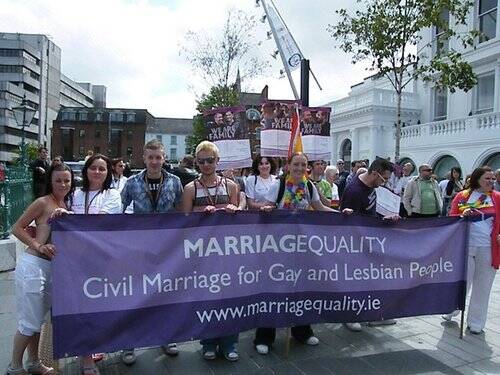Last weekend Ireland became the first nation in the world to legalize same-sex marriage through a popular referendum, a win largely credited to a door-to-door campaign and voter registration drive. Ironically, the victory came only days after the discrediting of an American study suggesting that personal interactions with gays and lesbians greatly increased support for same-sex marriage. It may not be easy for other proponents of social change to duplicate the winning strategy in Ireland, which is not as deeply divided among racial, religious, and geographic lines as a country like the United States.
The New York Times’ Danny Hakim and Douglas Dalby report that 62 percent of Irish voters supported same-sex marriage, with a relatively high 60 percent of eligible voters casting ballots. “Not long ago, the vote would have been unthinkable,” Hakim and Dalby write. “Ireland decriminalized homosexuality only in 1993, the church dominates the education system, and abortion remains illegal except when a mother’s life is at risk. But the influence of the church has waned amid scandals in recent years, while attitudes, particularly among the young, have shifted.”
Hakim and Dalby credit the grass-roots nature of the “yes” campaign (“tens of thousands of doors were knocked on”) and quote an Irish senator who opposed same-sex marriage but admitted, “The personal stories of people’s own testimonies, as to their difficulties growing up being gay certainly struck a chord with people.”
The outcome in Ireland may be a source of encouragement not only to supporters of gay marriage, but any political movement that hoping that familiarity can lead to changed minds. Personal testimony is a common tactic, used not only in emotional issues such as abortion, gun control, and the availability of health care, but in just about any political debate. The most obvious way to argue for more transit funding, for example, is to let voters tell their horror stories about being stuck in traffic jams or on stopped trains.
So it wasn’t surprising that many activists celebrated a study from last December suggesting that gays and lesbians themselves were uniquely effective in door-to-door campaigns promoting same-sex marriage. “The results…show that both gay and straight canvassers produced large effects initially,” the authors claimed in an article for Science magazine, “but only gay canvassers’ effects persisted in 3-week, 6-week, and 9-month follow-ups…. Contact with gay canvassers further caused substantial change in the ratings of gay men and lesbians more generally.”
That study has since been discredited, as one of the authors has admitted to falsifying data, and it’s the retraction that confirms the worldview of most political scientists. Eitan Hersh writes in the Washington Post that the study’s conclusion was suspicious from the start: “a large body of social science research suggests the opposite is more likely true: If you want to convince a white, suburban, straight, gay-marriage opponent to change their mind, recruit one of their white, suburban, straight neighbors to engage with them. Young, out-of-town, gay activists should actually be less effective.”
Hersh has a simple piece of advice for door-to-door campaigns: “Do not send people most affected by an issue; send people who most resemble the people you are trying to convince.”
Hersh and a colleague wrote their own study last year, noting that canvassers for President Barack Obama’s 2012 re-election campaign were, as the New York Times’ Derek Willis put it, “often more liberal, better-educated, whiter and richer than the voters they were attempting to persuade or mobilize through phone calls and knocking on doors.” Hersh told Willis that the older volunteers assigned to data entry work at Obama campaign offices might have made better door-to-door ambassadors. (Obama, of course, won anyway. Not so lucky was Howard Dean, the Democratic presidential candidate who flopped in the 2004 Iowa caucuses. Many political reporters speculated that Iowa voters were turned off by Dean’s college-aged volunteers from out of state, who sported bright-orange hats reading PERFECT STORM.)
If voters respond better to activists who resemble them, it would make sense to pursue change at the local level rather than through state or national politics. That is, a campaign in which neighbors talk to neighbors would be more effective than one in which rural white voters must try to win over urban non-whites, or vice versa. If this is true, we may be seeing more cities adopt minimum-wage increases and traffic laws favoring bicyclists, at least in states where urban activists are not exactly welcomed on suburban streets.
Ireland is 95 percent white and 85 percent Catholic, with little more than half the population of New York City and about the same land area as North Dakota. So the gay marriage referendum was a far more neighborly affair than an American presidential campaign or an election in most states. Bringing personal stories door to door may be quite effective in such a cohesive society; the tactic may require more finesse in a more complex nation like the United States.








